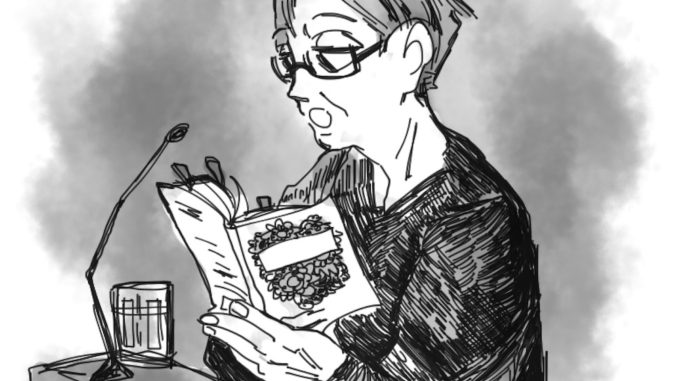
By Peter Kranitz
I first encountered Rae Armantrout’s poetry when I was working for Fonograf Editions, a Portland-based vinyl record-only poetry press. Armantrout’s “Conflation” is the press’s second release, featuring recordings of the poet reading both previously published work and pieces from yet-unpublished manuscripts. Listening to the record, I was immediately taken in by her crisp annunciation and the way her high, flute-like voice so clearly intones her language. Amazingly, although I had never seen these poems on paper, I could tell exactly where the line and stanza breaks went. Her poems look at the world slightly askance, refracting the familiar through a lens of wry curiosity.
“I like a poem that surprises me,” Armantrout told me before her reading in the Frank Manor House on Oct. 24. “Ultimately you don’t want to think ‘well that’s just wrong,’ you want to go ‘oh that’s good, I never thought of that.’”
Indeed, Armantrout’s poems do just that. Her career spans nearly 40 years and includes a Pulitzer Prize win for her 2010 collection, “Versed.” Her latest chapbook, “Entanglements,” is a collection of poems inspired by quantum physics, the result of her decades-long interest in the field. Other poems draw from the more mundane: an ad on the back of the New Yorker, a line from an Instagram poet, a garbage can at Starbucks. Armantrout’s poems have an immediacy that comes from writing in what she refers to as the subjective present, a span of “about three seconds.”
“Mostly I respond to what comes into my attention, and it gives me ideas and I riff off it,” Armantrout said. “I’m not saying that I only include things that I had just seen, but it usually starts with something I had just seen or just heard.”
Armantrout tinges the present moment with her distinct blend of irony and linguistic playfulness, at times even manifesting as a literal pleasure in the language: the speaker of “Scumble” invites the reader to imagine “if I were turned on by seemingly innocent words.” The often understated humor of Armantrout’s poetry frequently comes from this linguistic play, creating phrases like “insouciant septuagenarians” in “Sonnet 3,” or the first line of “My Erasures,” itself an erasure of someone else’s Facebook post: “My erasures were featured.”
At the Frank Manor House, Armantrout read from “Entanglements” and “Partly,” her 2016 collection of new and selected poems, as well as poems from forthcoming manuscripts. Many of the poems she read are also featured on “Conflation,” yet the experience of seeing them read in person differs dramatically from hearing the recordings. Poetry readings are inherently performative, even with less expressive writers. Listening to a poet read his or her own work illuminates how they hear it, the cadences and rhythms that he or she envisioned when writing it. Seeing a poet read adds a more expressive dimension; the poet’s body language and mostly subconscious movements reveal how a poem feels. Armantrout rolling her eyes when describing a car on a mountain road as “so cliché” in “Object Permanence,” shaking her head with the “don’t ask” in the last line of “Persistence” or tapping her hand on the podium with each line in “Pinocchio” may have little bearing on the meaning of the poems, but it subtly changes the tone, modifying and amplifying elements that could slip by unnoticed on the page.
At the end of the reading, Armantrout answered questions about her inspirations, her writing process and her attempts to grapple with the political through poetry. Armantrout was in part influenced by the Orwellian misdirection of politicians in the Vietnam War era. Now, in a political atmosphere that she sees as defined by unobscured “evil,” the political is more difficult to address.
“How can you be more surreal, how can you get out ahead of what’s happening,” Armantrout said. “(It’s) weirder than you could possibly imagine or catch up with, which makes it a little hard for an artist.”
Subscribe to the Mossy Log Newsletter
Stay up to date with the goings-on at Lewis & Clark! Get the top stories or your favorite section delivered to your inbox whenever we release a new issue.

Leave a Reply